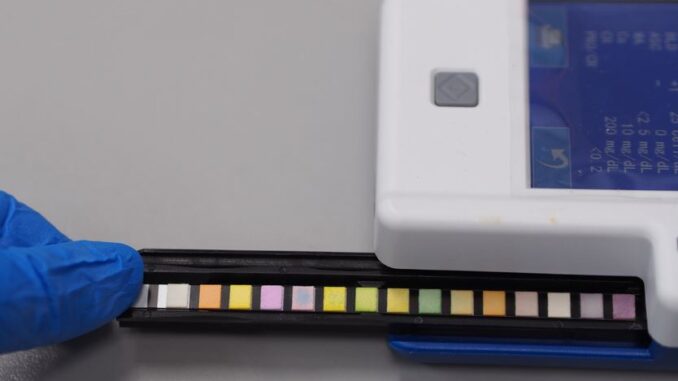
As the director of a general practice veterinary hospital, I am often presented with dogs who are showing urinary tract infection signs. Urinary tract infections (UTIs) are common in dogs. These dogs show clinical signs such as frequent urination, straining, and blood in the urine. Urinating very small amounts, and frequent licking of the genitals are also common signs of a UTI. Owners often notice that the urine has a very strong odor as well. In this article, we will review the role of antibiotics in the treatment of UTIs.
When are antibiotics needed to treat UTIs in dogs?
Urinary tract infections are caused by the presence of bacteria in the urinary tract. Once an infection is established and is causing clinical signs, treatment with an appropriate antibiotic is imperative. Over-the-counter supplements can be useful for the prevention of UTIs but will not treat a current infection.
What are the antibiotics most often used to treat UTIs in dogs?
To properly treat a urinary tract infection in a dog, the urine should be collected and tested. A urinalysis will be performed to look for white and red blood cells, protein, and the presence of bacteria.
If signs of a UTI are seen, the urine should be cultured. A urinary culture involves placing the urine on an agar plate and allowing the bacteria present in the urine to grow. Once grown, the laboratory will conduct testing to identify which bacteria are present.
Next, small discs containing different antibiotics will be placed onto the surface of the agar. The effectiveness of each antibiotic will be judged by how large the area is that is cleared of bacteria surrounding each disc. If bacteria are easily and readily controlled by an antibiotic, they are said to be “sensitive” to that antibiotic.
Once this testing has been completed, the veterinarian will prescribe an appropriate antibiotic to treat the infection. The antibiotic will be chosen to be both effective and also in keeping with antibiotic stewardship guidelines. These guidelines enable veterinarians to use antibiotics responsibly and to not contribute to antibiotic resistance in both animals and humans.
Commonly prescribed antibiotics for UTIs in dogs include penicillins, cephalosporins, and rarely fluoroquinolones.
What are the factors considered by veterinarians when choosing which antibiotics to use?
Veterinarians take many factors into account when choosing antibiotics to treat their patients. As discussed above, both effectiveness against the bacteria causing the infection, as well as proper antibiotic stewardship are taken into account.
Other factors considered include dosage form and frequency of administration. Some dogs may prefer a liquid over a tablet or may need a flavored chew to entice them to take their medicine.
An owner’s lifestyle and schedule may dictate how many doses can be given to the pet daily. Always communicate with your veterinarian about the needs of both you and your pet before they prescribe a medication.
What is the prognosis when treating UTIs with antibiotics?
In most cases, urinary tract infections in dogs are fairly easy to treat. However, there are many factors to consider. As previously discussed, it is imperative to treat with an antibiotic that the bacteria involved are sensitive to. It is also important that the entire course of prescribed antibiotics be administered and that they are given at the correct intervals. If the entire course of prescribed medication is not given, or the dosing interval is not followed, all the bacteria may not be controlled, which will result in a recurrence of clinical signs.
Are there any downsides to using antibiotics to treat UTIs?
If your dog is suffering from a urinary tract infection, antibiotics will likely be necessary. Though treating with antibiotics typically requires the administration of medicine by the owner, this is required to relieve your pet’s pain and discomfort. Loss of appetite, vomiting, and allergic reactions may occur with antibiotic use. If any of these issues arise, please contact your veterinarian. Prebiotics and probiotics may be helpful in restoring your dog’s gut flora following antibiotic therapy.
Are there any alternatives to antibiotics?
In dogs, antibiotics are nearly always required to resolve a urinary tract infection that is causing clinical signs. Like in humans, the immune system is able to control some mild UTIs without the need for antibiotics; however, these infections are typically not severe enough to cause noticeable clinical signs such as frequent urination and licking.
Once an infection in the bladder has progressed to the point that it is causing pain and discomfort, antibiotics are likely needed. It is important to remember that urinary tract infections are painful and that dogs affected by UTIs are suffering. Appropriate treatment should not be delayed in hopes of the infection simply going away.
There are strategies, diets, and over the counter supplements that can aid in preventing urinary tract infections. Increasing the amount of water that your dog is drinking can be very helpful. Dogs also need to have the opportunity to frequently empty their bladders. If your dog has an anatomy abnormality, such as a hooded vulva, or allergies that cause genital licking, these issues need to be addressed. Speak to your veterinarian about urinary specific diets and supplements.
Disclaimer: This website's content is not a substitute for veterinary care. Always consult with your veterinarian for healthcare decisions. Read More.


Be the first to comment